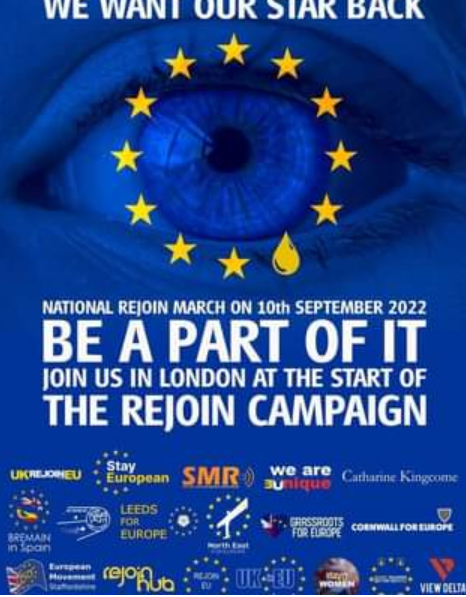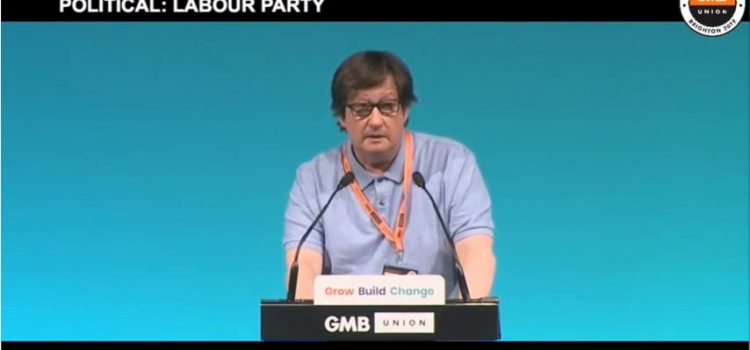I think I’ll be going on this.

I think I’ll be going on this.


The Forde Report commissioned by Labour’s NEC has been published. I have not read it all yet but have discovered the first quote, on the dangers of continued factionalism as it related to the new proscription rules and had the second on the need to conform to A6 of the ECHR pointed out to me.
§A We are also concerned that the provisions which allow for individuals to have membership removed or denied on the grounds they have committed prohibited acts could be exploited for factional purposes.
§F 3.1 We note the new arrangements, approved by the Party at its Conference in 2021, which make provision for various reforms, including the establishment of an IRB in cases involving accusations of discrimination. The Party will need to be vigilant that those new procedures, when combined with the further reforms we recommend in this report, deliver a system which, as far as is practicable, enshrines the core principles of Article 6 of the European Convention on Human Rights, ….
The Forde Report
Three things: I’d have preferred a stronger mandate than concern and a need for vigilance, and for me A6 is so last year. I have moved on to A7 “No punishment without law”, which states “ No one shall be held guilty of any criminal offence on account of any act or omission which did not constitute a criminal offence under national or international law at the time when it was committed.” Obviously, the scope needs to be changed to be prohibited under rule or law, but the principal is obvious and the NEC is in flagrant breach of this principle.
Finally, the report seems exclusively focused on discriminatory behaviour, it seems to fail to address bullying and cover-ups whether undertaken by staff or senior role holders. …

I am provoked by Chris Grey’s article, “Making Brexit Boring”; it’s long and covers a number of dimensions of the consequences of Starmer’s speech on Labour’s new approach to the EU. Much of his Brexit blog I agree with and find informative, but I have a couple of things to say on this article.
He writes,
Yet that answer [i.e. Labour’s differences with the Government] is a disappointing one, and in some key respects an ambiguous one. It could hardly have given less to erstwhile remainers without being indistinguishable from the government’s policy. It offered the bare minimum of an alternative, and no one could call it an inspiring vision for Britain’s future. But it wasn’t altogether empty, and its critics should be careful not to fall into the age-old political trap of ‘making the perfect the enemy of the good’.
Chris Grey – Brexit & Beyond
This I feel summarises what Grey thinks of Labour’s position but I hope I don’t fall into the trap he identifies. He also disagrees with those who describe Starmer’s position as cakeism,
It’s also misguided to suggest, as some claimed following the speech, that Starmer’s proposals are ‘cakeist’ (i.e. calling for the benefits of EU membership without belonging).
Chris Grey – Brexit & Beyond
I had not realised that Peston had described the trade barrier proposals as cakeism and I comment on his article below. I believe that arguing for enhanced business visas, mutual recognition of professional qualifications while rejecting free movement of presumably unqualified labour is ‘cakeist’ , unlikely to be agreed by the EU and fails to recognise the UK economy’s labour shortage crisis. It’s pandering to the racism inherent in the objection to free movement and the only way to put this right is to agree to the EU’s freedom of labour and reverse the hostile environment. Many of those who’ve left the UK have done so because they feel unwelcome due to the racism enabled and encouraged by the referendum result.
While Grey welcomes Starmer’s embrace of a Security deal, both he and Stramer fail to recognise that this will entail agreeing to CJEU supervision/jurisdiction of wide areas of our administration of justice. While I have no problem with this, if he is prepared to have the CJEU rule on civil liberties, what’s the problem with having them adjudicate trade issues. Starmer’s line on security co-operation is thus also arguably ‘cakeist’, although the number of people on top of this seems very limited. Although yesterday, the government published its plans for the Data Reform Bill which ORG describes as gutting the GDPR and if so may jeopardise the UK’s ‘adequacy agreement which was another point in Starmer’s plan to retain regulatory alignment with he EU on data and financial services.
Peston in his article also accuses Starmer of cakeism, albeit before I did. His article focuses on the trade aspects of Starmer’s five point plan, I take the alleviation of trade friction as a given in any policy, although I am less sanguine that easing trade friction between NI and Great Britain will have any benefit in calming the political friction in Northern Ireland and Starmer’s plan focuses on that specific trade flow and not cross-channel trade.
Peston avoids looking at how Labour’s remainers/rejoiners will react to the brutal policy outlined by Starmer and Lammy. As I note elsewhere, the tide is flowing against them. …

I attended the AGM of the LCFM over the weekend, here are my notes. I attended breakouts on organising in the Unions to oppose the illegal aspects of the hostile environment, this was led by a spokesperson from PCS, we in the GMB have things to learn from them and a second session on ending detention centres.
The final session was addressed by Ben Smoke, one of the Stansted 15, Ana O from the LCFM NC, and Nadia Whittome MP. My highlights from this were learning that the S15 were prosecuted for Terrorism and yet the final court disposition .stated there was no case to answer. Free movement is about the rights of people when they get here, in particular in the work place but also of course under the hostile environment in the housing market, banking services and health services. The anti-raids network is an effective anti-racist anti deportation movement, Labour is no longer part of this. And from Nadia’s speech I am reminded that Govt’s need movements to keep them on the straight and narrow, when they’re awful they can oppose, and when they’re friendly they can ensure that countervailing pressures are in place so they are not blown of course.,
There's more overleaf ....

A development of “Sensibleness Postponed“, and possibly other articles on this blog with stronger economics and better evidenced polling data was posted to Brexitspotlight yesterday. Brexitspotlight is published by Another Europe/AEIP. …

Despite the picture above, this is a short piece of comparative politics, comparing the US Constitution with that of the EU, taking in some lessons from the UK. I have just watched The Original Intent of the [US] Constitution by Prof. Mark Stoler. This taught me some things and this essay reviews these points and looks at lessons for the UK, the EU and the rest of the world.
I look at the “Separation of Powers” vs “Parliamentary Sovereignty”, note that checks and balances are designed to protect the [untitled] aristocracy against the mob, that without the Bill of Rights, the US Constitution may well not have been agreed. I note the desirability of a basic law, with the ability to amend, but not as flexibly as is the case in the UK. I look at constitutional inflexibility in the residual construction of the US Senate and the EU veto. I look at the need for federal taxation powers. I have concluded that parliaments need a freedom of action, and the freedom to negotiate between party programmes. The paradox is that they need to be constrained which is why we need human rights law.
The lecture to me reinforces the need for a subsidiarity guarantee within a constitution, including taxation powers, and a human rights guarantee, remembering that human right law is designed to protect you from the Government. Vetoes are a topic for another day, although much of the failings in the US Constitution can be placed at the door of single seat constituencies, including the Presidency, elected by simple plurality, or indirectly in the case of the Presidency. I say more overleaf ….

I have been published on Brexit Spotlight. The article reviews the macro economic reporting and increasingly obvious failure of Brexit, it critiques the Labour Party leadership’s recent response reported at least by me in these two blog articles, Sensibleness Postponed, and my take on Lammy’s speech a week earlier , looks at other political forces within and outside the Labour Party. It highlights the Redfield Wilton opinion polling showing growing support for the single market and rejoining the EU and ends with a warning, that Labour “is terrified of setting out a principled case that seeks to lead, not follow, the electorate. Ironically, he i.e. Starmer risks losing Labour voters – especially young and working-age voters – with this strategy”. …

I had a couple of requests to look at the Labour bureaucracy’s refusal to allow equality branches access to the membership lists leaving old men to convene meetings of the women’s branch and young labour. This borrows significantly from the current rules in Appendix 2 and it would be hard for the NEC to argue it was poorly written or badly motivated.Too late now, but here it is …
Insert New C2.III.6 The NEC shall issue procedural guidelines on issues relating to access to the membership system or systems from time to time. These guidelines will ensure that the following members/member roles have access to the membership list,
A. For CLP’s: Vice Chair/Membership and CLP Secretary, or other designated CLP officers
B. For Branches: Secretary or other designated branch officer; this is to include Women’s Branch & Young Labour secretaries.
C. For LGC’s: Secretary or other designated LGC officer, where required for selection purposes or other activities in pursuit of its aims and objects
D. MP’s,, members of devolved bodies, elected mayors, councillors, Labour Group leaders on principal authorities, for the area they represent
E. Members of Party staff appointed by the NEC
Officers of relevant Party Units, elected public officials and staff appointed by the NEC shall be provided with access to the membership data or relevant party systems for the purpose of informing members of events, meetings and other activities or business relating to that role. It must not be used for the purpose of campaigning in internal elections, candidate selections, promoting personal opinions or collecting information and data for a third party i.e. through surveys/petitions. …

I was tidying up my hard disk and came across the notes of a speech I gave GB 2019. I reported the speech on this blog but while many are saying that time moves on and things of changed, I feel the speech is prescient in its prediction of the failures of Brexit and the collective failure of much of the Trade Union movement to represent its membership. I wanted to say that the pusillanimous position of the CEC should be rejected as you can see in the speech. The 2019 European Parliament elections had just taken place showing the compromisers that the nation wasn’t willing to do that. It was make your mind up time. The Union leaderships allowed themselves to be captured by the Party. Anyway, this is what I planned to say, as they say on press releases, check on delivery.
President, Congress, Dave Levy, London Central General Branch, London Region, 1st time delegate, speaking in support of the CEC Special Report on Brexit
Brexit is poisoning politics and stopping us from addressing the issues that matter to people. It stops us talking about how a radical manifesto can heal the country from the ravages of both Thatcherite and 21st Century Tory austerity.
Not only do Labour’s promises of investment in infrastructure and education offer hope, the answer to low wages is labour marker reform, stronger minimum wage legislation, and to empower the Trade Unions and regulate management. It is not to blame migrants and to extend the hostile environment to another 3m citizens, our neighbours & fellow members and continue the Tory’s voter suppression, excluding them from votes to which they are entitled.
It has been clear since June 2016 and the failure of Leave.EU to articulate an exit model that there was always going to need to be a final say referendum. At the time, or shortly after I argued that the negotiations should be done by those that believe in it. That’s what happened but now we should be asked, all of us, those who voted leave, those who voted remain, those too young to vote last time, citizens abroad denied their vote and EU citizens resident in the UK, asked with humility if that is what is still wanted.
Constructive ambiguity is no longer an attractive position. It loses both remain and leave votes. This is proven to all except the most blinkered by last month’s EU Parliamentary results, the worrying subsequent polls and for those of us that have been out there, personal experience.
Labour lost nearly 60% of its vote, mainly to explicitly remain parties. In my home in Lewisham, despite the Council’s position of strongly supporting a 2nd referendum, the Mayor would be a LibDem. The inconvenient truth is that loosely aligned Remainers leant us their vote in 2017. We should also remember that most of labour’s members and presumably ours and voters want to remain.
While I can respect the voters who voted leave, the result is so criminally flawed that courts would have ordered a rerun if it had been deliberative. i.e. not consultative.
The CEC paper does not go far enough and while stating we oppose a no deal Brexit is welcome, that’s where we were in 2016 and yet we are now in an extension period and running out of time to get a satisfactory deal.
Imagine a worse case situation in the spring, a chaotic Brexit has led to queues on the M20, factory layoffs, food & medicine shortages and high inflation after a currency collapse. We will be telling people that all this is very terrible and should be fought, but, oops… if we actually facilitated Brexit, we won’t be heard. It won’t wash.
It maybe time to make up our mind if we want to alienate the majority or minority of our voters.
Labour’s Conference has been clear since 2016, on the basis of GMB motions that its position is to oppose leaving on inadequate Tory terms and now is the time to say that the Tory’s terms fail to meet our needs. Both May’s deal and No-Deal fails to meet Conference 16 policy; it fails to meet the six tests and fails to meet Conference 18’s thresholds. There’s no protection for jobs, employment rights, environmental protection or consumer rights. And no deal means the reimposition of a border in Ireland.
It’s time! We need a public vote and Labour should declare for Remain. There’s no other option on the table. I’d also urge delegates to look with favour on M xxx. . It’s not a London Region motion so we will listen to the debate before deciding which way to vote.
The picture is not of that speech, may equally not be the correct conference. …

Phil Burton Cartledge analyses the political platforms and accountabilities of the Tory wanabee leaders and their fetish with reducing tax by which they mean corporation tax. The FT reports on business’s response to the proposal, which is lukewarm. They point out that only businesses that make a profit pay corporation tax and that for a business of any complexity[1] and with decent accountants, corporation tax is voluntary. The FT article calls for broader support including demand stimulation albeit through tax cuts, but importantly they raise the issue of VAT on energy (but they pay that too) and also investment incentives. VAT at 20% is ridiculous and the Govt. should reduce it; it can now we are out of the EU.
Phil talks about the conflicts in Johnson’s electoral coalition and the victory of the rentier capitalists in gutting any meaningful levelling up programmes, which have been reduced to crude electoral bribes. This is a long-term trend. We used to call it Regional Policy and I looked at New Labour’s failure to put this right; they were driven by unproven meso-economic theories and then polluted the programme with concerns about welfare to work and regional assemblies.
I should add that another cause of the failure of a levelling up programme is the loss of EU funds. While business is arguing for re-joining the R&D fund, Horizon Europe[2], some local authorities are now lamenting the losses of the European Regional Development Fund & European Social Fund. This was worth about €4bn[3] p.a. to the UK. The UK Government has never it seems been particularly good at getting EU money for business and people and yet the UK has many of the poorest areas Northern Europe.
It’s another necessary dimension of the ‘closest possible’ relationship. The regional programmes were first launched on the UK’s accession to the EU as a means of reducing the UK’s net contribution to the EU. It seems we’re missing them now.
[1] This does exclude most patron personal services companies so perhaps the policy is designed for them.
[2] Horizon Europe has rules that create an enhanced ‘multiplier’ effect.
[3] This includes UK Gov matching funds.
Image Credit: Ilovetheeu, CC BY-SA 4.0 https://creativecommons.org/licenses/by-sa/4.0, via Wikimedia Commons …